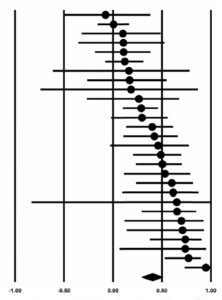In 1974, philosopher Thomas Nagel famously asked, what’s it like to be a bat? I am not sure that this question has been answered satisfactorily, so maybe we should focus on a slightly more circumscribed variant of the same question: What’s it like to be a chess grand master?
Cognitive scientists have been addressing this question for more than half a century, and we now know a lot about the performance of chess experts (arguably much more than we know about the mental life of bats).
One consistent finding has been that expert chess players have a phenomenal memory for chess positions. To illustrate, consider a chess board in the middle of a game. Now imagine that someone covers up the figure after 5 seconds, then presents you with an empty chess board and all the pieces next to it, and asks you to reconstruct the position from memory. How well would you do?
It turns out that chess experts perform this task with astonishing accuracy, as shown in the video below:
[youtube https://www.youtube.com/watch?v=rWuJqCwfjjc&w=560&h=315]
The results of a plethora of such experiments can be readily summarized: When presented with legitimate game configurations, chess experts can recall the pieces with great accuracy and their performance is far superior to that of novices. When the chess configurations are random, the experts’ performance suffers and is not readily distinguishable from that of novices.
This superior memory for meaningful configurations has often been explained by appeals to high-level knowledge structures that permit the expert to encode information rapidly and accurately. On this view, experts will recognize a complex position as being “an Italian opening, variation Giuoco Pianissimo, with White’s pressure on the white squares” (if this doesn’t make immediate sense, Wikipedia can come to the rescue).
Intriguingly, however, there is a bit more to the story. In a meta-analysis published in 1996, Fernand Gobet and Herb Simon showed that experts maintained some (slight) advantage over novices even with random positions without any intact high-level structure. That is, although as a first approximation experts and novices don’t differ in their ability to recall random chess configurations, a more fine-grained and powerful analysis reveals a slight—but robust—expert advantage.
Although this difference is small in size, its theoretical import is quite large because the difference cannot be explained by models focusing on high-level representations such as “Giuoco Pianissimo”. Instead, it appears that experts can latch onto the small meaningful chunks that remain in random positions by chance, even if “Giuoco” has been disrupted beyond recognition.
In a recent article in the Psychonomic Society’s journal Memory & Cognition, researchers Giovanni Sala and Fernand Gobet reported a meta-analysis of articles that examined memory for random material with experts and novices across many domains. That is, whereas existing analyses had focused on random chess positions, Sala and Gobet extended the approach to other domains.
Sala and Gobet conducted a systematic literature search of various scientific databases which yielded 45 studies including 1,401 participants. The range of expert domains was quite broad: Several studies examined computer programming skills, where the random material involved presentation of lines of a program in random order. Other domains included the game of bridge (with unstructured bridge hands being the random material), music (shuffles notes in a musical stave), climbing (impossible routes on a climbing wall), chemistry (random sequences of chemical symbols), and taxi drivers (random presentation of street names).
To examine the data, correlations were computed between the expertise of participants in a domain and performance in recalling random material from that domain. The obtained correlations are shown in the figure below, where each dot and 95% confidence interval represents a different independent sample. The diamond at the bottom represents the meta-analytically weighted correlation coefficient.

It is clear from the figure that in the majority of cases, there was a correlation between expertise and memory performance with random material, although for a number of the studies that effect was not significant. Across studies, however, there is no doubt that an effect is present, as revealed by the diamond at the bottom which is comfortably above zero.
What explains the differences between the various studies? Sala and Gobet conducted a moderator analysis and discovered that the domain of expertise was partially responsible for the heterogeneity among samples. Thus, the correlations were .42 for games (e.g., bridge); .69 for music; .36 for programming; .30 for sports; and .24 for other domains. The correlation for music stood out as being greater than those for the other 4 correlations, the smallest two of which did not reach significance. The greater skill effect for music likely reflected the lower degree of randomness that can be achieved with musical material, as compared to chess, rather than anything inherently special about that domain.
The outcome corroborates the idea that expert memory is capable of exploiting very small structures (such as chunks of a few chess pieces that are stored in long-term memory). By contrast, theories based on high-level structures cannot explain these results because no high-level structures are present in random materials.
The sensitivity of expert memory to subtle environmental cues is quite astonishing. It deserves to be added to the list of amazing human accomplishments.
Article focused on in this post:
Sala, G., & Gobet, F. (2017). Experts’ memory superiority for domain-specific random material generalizes across fields of expertise: A meta-analysis. Memory & Cognition, 45, 183–193. DOI: 10.3758/s13421-016-0663-2.
